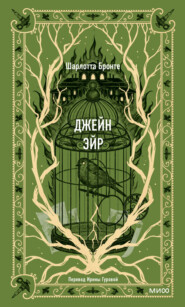По всем вопросам обращайтесь на: info@litportal.ru
(©) 2003-2024.
✖
Shirley
Настройки чтения
Размер шрифта
Высота строк
Поля
“A presumptuous fool!” repeated Matthew.
Here Mrs. Yorke commenced rocking herself – rather a portentous movement with her, as it was occasionally followed, especially when Matthew was worsted in a conflict, by a fit of hysterics.
“I don’t see why I should bear insolence from Matthew Yorke, or what right he has to use bad language to me,” observed Martin.
“He has no right, my lad; but forgive your brother until seventy-and-seven times,” said Mr. Yorke soothingly.
“Always alike, and theory and practice always adverse!” murmured Martin as he turned to leave the room.
“Where art thou going, my son?” asked the father.
“Somewhere where I shall be safe from insult, if in this house I can find any such place.”
Matthew laughed very insolently. Martin threw a strange look at him, and trembled through all his slight lad’s frame; but he restrained himself.
“I suppose there is no objection to my withdrawing?” he inquired.
“No. Go, my lad; but remember not to bear malice.”
Martin went, and Matthew sent another insolent laugh after him. Rose, lifting her fair head from Moore’s shoulder, against which, for a moment, it had been resting, said, as she directed a steady gaze to Matthew, “Martin is grieved, and you are glad; but I would rather be Martin than you. I dislike your nature.”
Here Mr. Moore, by way of averting, or at least escaping, a scene – which a sob from Mrs. Yorke warned him was likely to come on – rose, and putting Jessy off his knee, he kissed her and Rose, reminding them, at the same time, to be sure and come to the Hollow in good time tomorrow afternoon; then, having taken leave of his hostess, he said to Mr. Yorke, “May I speak a word with you?” and was followed by him from the room. Their brief conference took place in the hall.
“Have you employment for a good workman?” asked Moore.
“A nonsense question in these times, when you know that every master has many good workmen to whom he cannot give full employment.”
“You must oblige me by taking on this man, if possible.”
“My lad, I can take on no more hands to oblige all England.”
“It does not signify; I must find him a place somewhere.”
“Who is he?”
“William Farren.”
“I know William. A right-down honest man is William.”
“He has been out of work three months. He has a large family. We are sure they cannot live without wages. He was one of the deputation of cloth-dressers who came to me this morning to complain and threaten. William did not threaten. He only asked me to give them rather more time – to make my changes more slowly. You know I cannot do that: straitened on all sides as I am, I have nothing for it but to push on. I thought it would be idle to palaver long with them. I sent them away, after arresting a rascal amongst them, whom I hope to transport – a fellow who preaches at the chapel yonder sometimes.”
“Not Moses Barraclough?”
“Yes.”
“Ah! you’ve arrested him? Good! Then out of a scoundrel you’re going to make a martyr. You’ve done a wise thing.”
“I’ve done a right thing. Well, the short and the long of it is, I’m determined to get Farren a place, and I reckon on you to give him one.”
“This is cool, however!” exclaimed Mr. Yorke. “What right have you to reckon on me to provide for your dismissed workmen? What do I know about your Farrens and your Williams? I’ve heard he’s an honest man, but am I to support all the honest men in Yorkshire? You may say that would be no great charge to undertake; but great or little, I’ll none of it.”
“Come, Mr. Yorke, what can you find for him to do?”
“I find! You’ll make me use language I’m not accustomed to use. I wish you would go home. Here is the door; set off.”
Moore sat down on one of the hall chairs.
“You can’t give him work in your mill – good; but you have land. Find him some occupation on your land, Mr. Yorke.”
“Bob, I thought you cared nothing about our lourdauds de paysans. I don’t understand this change.”
“I do. The fellow spoke to me nothing but truth and sense. I answered him just as roughly as I did the rest, who jabbered mere gibberish. I couldn’t make distinctions there and then. His appearance told what he had gone through lately clearer than his words; but where is the use of explaining? Let him have work.”
“Let him have it yourself. If you are so very much in earnest, strain a point.”
“If there was a point left in my affairs to strain, I would strain it till it cracked again; but I received letters this morning which showed me pretty clearly where I stand, and it is not far off the end of the plank. My foreign market, at any rate, is gorged. If there is no change – if there dawns no prospect of peace – if the Orders in Council are not, at least, suspended, so as to open our way in the West – I do not know where I am to turn. I see no more light than if I were sealed in a rock, so that for me to pretend to offer a man a livelihood would be to do a dishonest thing.”
“Come, let us take a turn on the front. It is a starlight night,” said Mr. Yorke.
They passed out, closing the front door after them, and side by side paced the frost-white pavement to and fro.
“Settle about Farren at once,” urged Mr. Moore. “You have large fruit-gardens at Yorke Mills. He is a good gardener. Give him work there.”
“Well, so be it. I’ll send for him tomorrow, and we’ll see. And now, my lad, you’re concerned about the condition of your affairs?”
“Yes, a second failure – which I may delay, but which, at this moment, I see no way finally to avert – would blight the name of Moore completely; and you are aware I had fine intentions of paying off every debt and re-establishing the old firm on its former basis.”
“You want capital – that’s all you want.”
“Yes; but you might as well say that breath is all a dead man wants to live.”
“I know – I know capital is not to be had for the asking; and if you were a married man, and had a family, like me, I should think your case pretty nigh desperate; but the young and unencumbered have chances peculiar to themselves. I hear gossip now and then about your being on the eve of marriage with this miss and that; but I suppose it is none of it true?”
“You may well suppose that. I think I am not in a position to be dreaming of marriage. Marriage! I cannot bear the word; it sounds so silly and utopian. I have settled it decidedly that marriage and love are superfluities, intended only for the rich, who live at ease, and have no need to take thought for the morrow; or desperations – the last and reckless joy of the deeply wretched, who never hope to rise out of the slough of their utter poverty.”
“I should not think so if I were circumstanced as you are. I should think I could very likely get a wife with a few thousands, who would suit both me and my affairs.”
“I wonder where?”
“Would you try if you had a chance?”
“I don’t know. It depends on – in short, it depends on many things.”
“Would you take an old woman?”
“I’d rather break stones on the road.”
“So would I. Would you take an ugly one?”

















